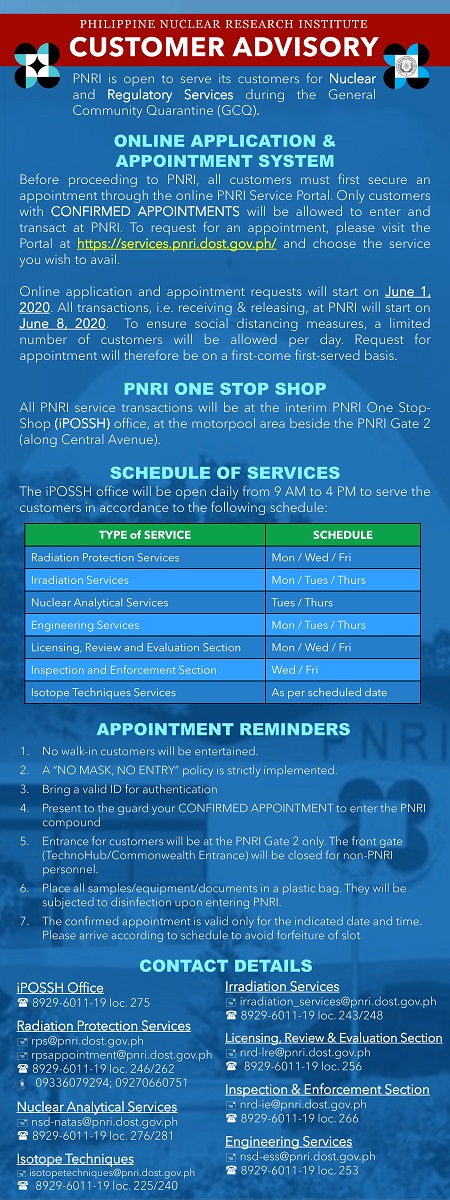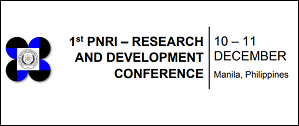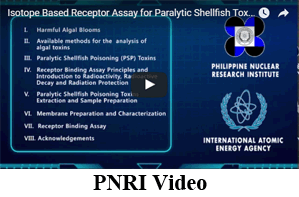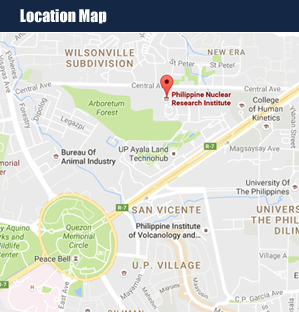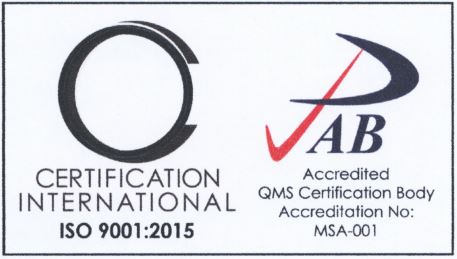Nuclear research facilities are open to the public
- Details
The Philippine Nuclear Research Institute (PNRI) - Department of Science and Technology (DOST) announces that its nuclear research and service facilities and laboratories will be open to the public during the 33rd Atomic Energy Week (AEW) celebration on December 5 to 9, 2005 at the PNRI compound along Commonwealth Avenue in Diliman, Quezon City.
The guiding theme for this year's AEW celebration is "Sustainability Through Nuclear Science and Technology".
The keynote speaker for the AEW opening ceremonies on December 5 is Dr. Augusto B. Santos, Socio-Economic Planning Secretary and Director-General of the National Economic Development Authority. Dr. Estrella F. Alabastro, Department of Science and Technology Secretary, will give the inspirational message.
Dr. Graceta DL Cuevas, AEW 2005 Executive Committee Chairperson, said that the public and other visitors would be given free guided tours to the PNRI laboratories and facilities during the weeklong celebration. In addition to the guided tours, the daily activities for the AEW celebration visitors include viewing of films and exhibits that will showcase the various beneficial uses of nuclear science and technology.
The other activities slated for the 33rd AEW celebration are on-the-spot poster making contest for high school students on December 5 and technical sessions on December 6 and 7. The topics for the technical sessions will be discussed by invited speakers from the Vienna-based International Atomic Energy Agency (IAEA), Comprehensive Nuclear-Test-Ban Treaty Organization (CTBTO), United Nations Development Program, United States Department of Energy, Regional Cooperative Agreement-Regional Office in Korea and from scientific institutions in Belgium, Japan and the Philippines .
As part of the AEW activities, the CTBTO Radiation Monitoring Station in Tanay, Rizal will be officially turned over to PNRI on December 8 in a ceremony to be attended by the CTBTO Radiation Section chief, the secretaries of the Department of Foreign Affairs and the DOST, the PNRI Director and staff from PAGASA, PHIVOLCS and the PNRI.
Students, teachers, other professionals and members of the public who would like to avail themselves of the guided tours and attend the technical sessions may call PNRI information officers Rhoda Leonin or Tina Cerbolles at 920 8787 for bookings and for further details about the AEW 2005 activities.
PNRI CELEBRATES BIRTH CENTENARY OF PHIL. FATHER OF ATOMIC ENERGY
- Details
The Institute successfully celebrated a century's legacy of the Philippine Father of Atomic Energy, Gen. Florencio A. Medina, last November 7.
The day-long activities started off with wreath-laying ceremonies at the monument of Gen. Medina, dedication of a park in his name, and the launching of the Gen. Medina Memorial Lecture. A mutant ornamental developed at PNRI, the Cordyline 'Medina', was also formally presented to the Medina family and an exhibit featuring Gen. Medina's memorabilia similarly opened for viewing. The UP Concert Chorus rendered a musical tribute in the afternoon, following a video presentation on the life and times of Gen. Medina.
Special guests were led by DOST Undersecretary Rogelio A. Panlasigui, members of the Medina clan, officers of the Nuclear Research Foundation, friends from media, and former colleagues of Gen. Medina at the Philippine Atomic Energy Commission (PAEC), which is the forerunner of today's PNRI.
The man acclaimed as the Father of Atomic Energy in the Philippines is remembered for his pioneering work as Commissioner of PAEC, and for his contributions in the peaceful use of nuclear technology during his subsequent stint at the International Atomic Energy Agency in Vienna, and at the National Science Development Board (NSDB) which he was tasked to head and organize.
Children, grandchildren and great grandchildren of Gen. Medina arrived to help organize the affair and to be part of the celebration.
RP TO HOST IAEA REGIONAL TRAINING COURSE
- Details
The Philippine Government is set to host from 14 to 25 November, the Regional Training Course on Authorization and Inspection of Radiation Sources in Radiotherapy in cooperation with the International Atomic Energy Agency (IAEA).
The course is being conducted under the framework of the Technical Cooperation regional radiation protection infrastructure projects, RAS/9/026 and RAS/9/039, and brings together representatives from twenty-two East and West Asian countries. Apart from fostering information exchange between these two groups, it is aimed that through the activity, participating Member States can be assisted in building up competence and expertise in controlling radiation sources in radiotherapy in accordance with international standards.
The two-week training, which will also be participated in by regulatory staff from PNRI and from the Bureau of Health Devices and Technology (Department of Health), will feature lectures, practical sessions, and a technical visit to a local radiotherapy facility. Ms. Eulinia Valdezco, who heads PNRI's regulatory division, is the Course Director.















